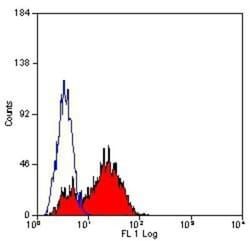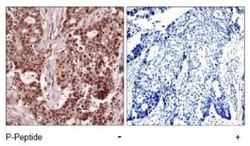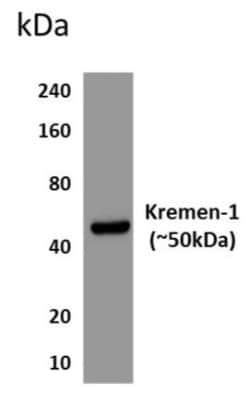CLEC10A/CD301 Antibody (ER-MP23) - BSA Free, Novus Biologicals™
Rat Monoclonal Antibody has been used in 1 publication
Manufacturer: Fischer Scientific
The price for this product is unavailable. Please request a quote
Antigen
CLEC10A/CD301
Concentration
1.0 mg/mL
Applications
Immunofluorescence, Flow Cytometry, Immunocytochemistry, Immunohistochemistry (Frozen), Immunohistochemistry
Conjugate
Unconjugated
Host Species
Rat
Target Species
Mouse
Gene ID (Entrez)
10462
Immunogen
Balb/c macrophage precursor cell hybrids
Primary or Secondary
Primary
Content And Storage
Store at 4C short term. Aliquot and store at -20C long term. Avoid freeze-thaw cycles.
Clone
ER-MP23
Dilution
Flow Cytometry, Immunohistochemistry 1:10-1:500, Immunocytochemistry/Immunofluorescence 1:10-1:500, Immunohistochemistry-Frozen 1:10-1:500
Classification
Monoclonal
Form
Purified
Regulatory Status
RUO
Gene Alias
CD301 antigen, CD301C-type lectin domain family 10 member A, CLECSF13, CLECSF14macrophage C-type lectin, C-type (calcium dependent, carbohydrate-recognition domain) lectin, superfamilymember 14 (macrophage-derived), C-type lectin domain family 10, member A, C-type lectin superfamily member 14, HML2, HMLC-type (calcium dependent, carbohydrate-recognition domain) lectin, superfamilymember 13 (macrophage-derived), Macrophage lectin 2, macrophage lectin 2 (calcium dependent), MGL
Gene Symbols
CLEC10A
Isotype
IgG2a
Purification Method
Protein G purified
Test Specificity
NB100-64874 recognizes murine CD301, a 38 kD cell surface protein that is otherwise known as macrophage galactose N-acetylgalactosamine lectin (MGL) or dendritic cell asialoglycoprotein (DC-ASGPR). In mice, CD301 is predominantly expressed on mature macrophages found associated with a wide range of connective tissues including macrophages in the dermis and the pancreas. Clone ER-MP23 also detects a population of dendritic cells in lymphoid tissue, which are probably recent immigrants from peripheral connective tissue sites. Expression of CD301 is induced by alternative (i.e. IL-4/IL-13 mediated) activation of macrophages and dendritic cells, but not all CD301 positive cells are necessarily IL-4/IL-13 stimulated. Clone ER-MP23 is reported to block the function of mouse CD301. The antibody binds both MGL1 and MGL2 homologues.
Description
- CLEC10A/CD301 Monoclonal specifically detects CLEC10A/CD301 in Mouse samples
- It is validated for Flow Cytometry, Immunohistochemistry, Immunocytochemistry/Immunofluorescence, Immunohistochemistry-Frozen.





